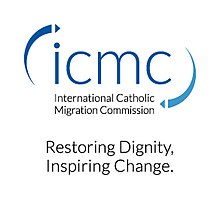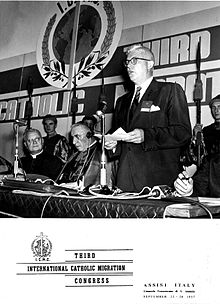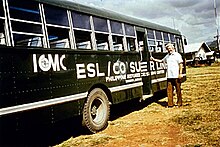International Catholic Migration Commission
This articleneeds additional citations forverification.(January 2017) |
 | |
| Formation | 1951 |
|---|---|
| Type | International non-governmental organization |
| Purpose | Humanitarian assistance, refugee resettlement |
| Headquarters | Geneva(Switzerland) |
Secretary General | Robert J. Vitillo(2016-present) |
President | Christine Nathan (2022-present) |
| Website | www.icmc.net |
TheInternational Catholic Migration Commission(ICMC) is an international organization that serves and protects uprooted people, includingmigrants,refugees,andinternally displaced people,regardless of faith, race, ethnicity or nationality. With staff and programs in over 40 countries, ICMC advocates for sustainable solutions[buzzword]and rights-based policies directly and through a worldwide network of 132 member organizations.
ICMC's expertise and core programming consists of refugee resettlement, humanitarian assistance and prevention (shelter, health,non-food items,cash assistance,disaster risk reduction,assistance and prevention for victims of sexual andgender-based violence,anti-trafficking), advocacy on migration and development.
ICMC hasECOSOCconsultative status since 1952 and was granted public juridical status by theHoly Seein 2008. In 2011, ICMC has been selected as the coordinator of the Civil Society network of the Global Forum on Development and Migration, which in 2015 brought together over 500 government delegates from more than 140 countries, 300 leaders ofcivil societyworldwide and high-level delegates fromUNand international agencies to discuss the relation between migration and development, share experiences and forge practical cooperation.[1]
Early years
[edit]
The founding of ICMC followed the end of theSecond World Warand the great displacement of peoples caused by the international conflict. By 1949, in Eastern Europe thousands were forced to flee their homes and seek refuge in the Western countries: it soon became clear to the Holy See in Rome that a systematic effort was needed on the part of Catholic organizations to respond to the needs of these migrants.
In 1951, German, Italian, and American laity and clergy – most notablyPope Pius XII,the Secretary of State Archbishop Giovanni Battista Montini (the futurePope Paul VI), Mr.James J. Norrisand CardinalJosef Frings– initiated the International Catholic Migration Commission (ICMC). The following year, Pope Pius XII formally established ICMC through a papal letter,Exsul Familia,[2]which brought worldwide attention towards the needs of migrants and invoked the support of the Catholics to welcome and assist foreign nationals fleeing their home countries.
In its early years, the work of ICMC focused on the administration of migrant travel loan funds. ICMC soon gained comprehensive expertise in assisting the migrants and increased its network of member organizations and local partners, thus becoming a worldwide movement.
1960s and 1970s
[edit]ICMC kept growing in the 1960s, expanding its activities through offices inBrazil,Venezuela,Colombia,ArgentinaandChile.By the early 1970s, the migration phenomenon had become more complex and international: the end of thewar in Vietnam,the attemptedgenocide in Cambodiaand violent events elsewhere caused massive and unprecedented migration flows. ICMC continued to assist European refugees relocate in new countries, while also starting new programs in South and Southeast Asia, the Near East, Africa and Latin America.
In 1979, while thousands of "boat people"fleeing Vietnam were perishing at sea, ICMC played a key role in theUNHCROrderly Departure Program(ODP),[3]while also providing legal and safe means of emigration for those Vietnamese migrants (mainly through resettlement in the United States).
In 1975, James Norris – one of the ICMC founders, who had by then been President of the organization for over 20 years – won the UNHCRNansen Refugee Award.[4]the highest UNHCR recognition for "extraordinary service to the forcibly displaced".
1980s and 1990s
[edit]
ICMC continued its operations in theSoviet Unionduring the 1980s, assisting Eastern European refugees resettle in Western countries. In the 1990s, ICMC played a lead role during thewar in Yugoslavia:the ICMC office inZagreb(Croatia), opened in 1993, processed thousands of resettlement applications – mainly byBosnian Muslimsseeking support to emigrate towards the United States. In 1997, ICMC initiated threemicro-creditinstitutions (inSerbia-MontenegroandKosovo) providing business loans, training and counselling to the uprooted people wishing to start a new life after the conflict.
In 1998, ICMC initiated a close partnership with UNHCR through the ICMC-UNHCR Resettlement Deployment Scheme, a roster of skilled resettlement experts, managed by ICMC, who play a key role in identifying and assessing the eligibility forresettlementof the most vulnerable refugees.[5]In 2015, the Scheme deployed a total of 189 experts to 78 UNHCR field offices in 39 countries; ICMC deployees submitted 33,656 Syrian refugees for resettlement.
In the late 1990s, ICMC started a closer collaboration with African organizations (including theOrganization of African UnityandCaritasCongo), thanks to which new programs begun inGuineaandBurundi.ICMC was also present inEast Timorin 1999, when severe turmoil followed its declaration ofindependence from Indonesia.
From the 2000s to nowadays
[edit]
2001 saw the beginning ofwar in Afghanistan.With large numbers ofAfghan refugeessoon able to return home after many years in neighboring countries, ICMC took immediate action and started in Afghanistan its largest-ever operation assistance: over 70,000 people returning fromPakistanandIranwere sheltered in camps.
In 2004, when thetsunamihit the Indonesian coasts, ICMC rushed to respond to what was to become one of the worst natural disasters in recent history. ICMC was already present in theAcehregion at the time and was therefore able to respond immediately to the devastation caused.
Political instability in theMiddle Eastsince the beginning of 2011 – notably theSyrian civil war– has caused mass displacements in the region. ICMC, active in the GreaterDamascusarea since 2006, started a number of projects focusing onIraqi refugeessettled in Syria, displaced people fleeing the conflict intoJordanand vulnerable people within the host Jordanian communities. The projects are implemented with the collaboration of ICMC's long-term local partner,Terre des HommesSyria.
A resettlement partner of the U.S. Department of State'sBureau of Population, Refugees, and Migration(BPRM) since the 1980s, ICMC operates a Resettlement Support Center (RSC) inIstanbul,Turkey, which refers eligible refugees to the U.S.Department of Homeland Securityfor consideration. In the last few years alone, the RSC has facilitated the resettlement of more than 37,000 eligible refugees from countries of firstasylum.
In 2014, ICMC initiated a large public-private partnership program (known as "ICMC Cares" ) to protectlabor migrantsin Eastern Europe.[6]The partnership includes the collaboration with public administrations, employment services, academic institutes, and private hospitals in Eastern Europe, and aims to expand to other European countries.
Headquartered inGeneva,Switzerland, ICMC has affiliated entities inBrussels,Belgium (ICMC Europe),Washington, D.C.,andBoston,U.S. (ICMC Inc.), as well as operational offices inGreece,Lebanon,Jordan,Turkey,Malaysia,andPakistan.
See also
[edit]- George Crennan,Director of the Federal Catholic Immigration Office in Australia from 1949 until 1995
- Anne Gallagher,President of the International Catholic Migration Commission (2018–)
References
[edit]- ^Global Forum on Migration and Development: civil society calls on governments to make better choices
- ^Apostolic Constitution of Pius XII, "Exsul Familia Nazarethana", August 1, 1952.
- ^International Catholic Migration Commission, "The United States orderly departure program", 1990. Available through theSpecial Collections and Archives of the UC Irvine Libraries.
- ^United Nations' High Commissioner for Refugees (UNHCR), "Archive of past Nansen Award winners".
- ^ICMC-UNHCR Resettlement Deployment Scheme
- ^ICMC Cares
- Christian refugee aid organizations
- Catholic Church organizations
- International charities
- Charities based in Switzerland
- Organisations based in Geneva
- Catholic organizations established in the 20th century
- Organizations established in 1951
- 1951 establishments in Switzerland
- International associations of the faithful

